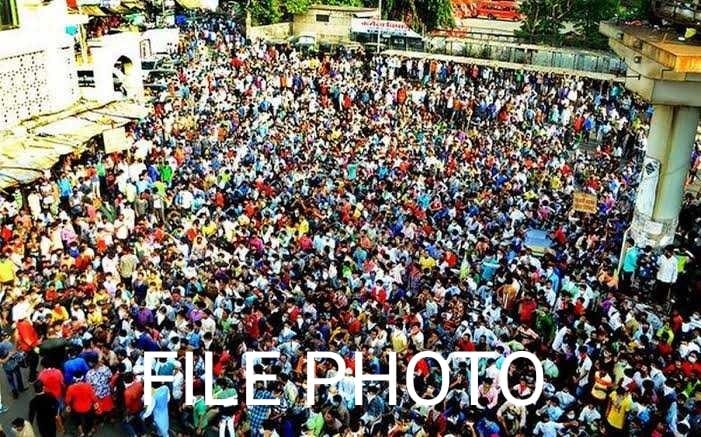The shops were closed and the streets empty, but there was a palpable tension at Mora village in Surat’s industrial belt of Hazira. The area was cordoned off by a heavy police presence.
Thousands of migrant workers, who worked in the industrial units of Hazira and lived in rented accommodations at Mora. Hazira, Gujarat. Major brands have their industrial campuses strung along the river from Surat to the sea: Larsen & Toubro, Reliance, Essar, Anti pc and others. This is a main vein of the Gujarat economy; the pride of industrial India.
There have been murmerings that the pride is now tarnished. Stories surfaced that workers have been trapped without pay and food. No-one knows how many workers are stuck. But anyone who has looked into it knows that the number is huge. Almost certainly, there are at least 70,000 workers stranded there.
For the migrants of Mora, staying in Surat has become both non-viable and difficult. Many of them said that they have only been paid for 20 days of March. They had to spend their last bit of savings on food as the Gujarat government’s free dry ration is only meant for locals, not migrants.
MLA Jignesh Mevani writes a letter to Gujarat Chief Minister, "My letter to Gujarat CM Vijay Rupani seeking is immediate intervention with regard to the fact that for the past 2 long month, thousand of migrant workers are caged, confined at Surat, Hajira. For god's sake, make proper arrangements of their food, water, shelter and ensure they are able to go back to their respective States. Let us don't treat them as slaves, please. MigrantWorkers are stuck in Hazira, Surat are caged & confined for their cheap labour for the benefit of the corporates. Is there a design to create modern day slavery to entertain the capitalist greed of ur friends?".
He said, "many of the workers want to return home. But the police station stopped taking applications to leave; they seem to be waiting until trains are available. There are rumours that the companies are pressuring the police to make the workers stay. Still, a couple of trains are due to leave as I write this. Some groups of workers have managed to register themselves, paying the price of Rs.700 per head to secure their way out. But those two trains filled up before most could even register to get a place. “The police are stalling,” a worker told me. “They always say ‘maybe tomorrow’ ”. Few workers manage to escape." It's my humble request that the state government should take the following steps to ensure the safe return of migrant brothers and sisters.The workers are desperate to go home, to escape and see their families. Many of the workers have told us that they will never return. They have told us that they would rather starve at home among their family. But the police and local government have been stalling their requests to go back home. The workers suspect that the police are being pressured by industry, and they have become petrified of speaking out.
Surat sees the highest influx of migrants from various parts of the country as well as parts of Gujarat due to its successful textile and diamond industry. According to a 2013 UNESCO report, 58 per cent of Surat’s population consisted of internal migrants — people who have come here from other parts of the country. There are about 10-12 lakh labourers from Odisha, Bihar, Uttar Pradesh, Jharkhand and Rajasthan.
The shops were closed and the streets empty, but there was a palpable tension at Mora village in Surat’s industrial belt of Hazira. The area was cordoned off by a heavy police presence.
Thousands of migrant workers, who worked in the industrial units of Hazira and lived in rented accommodations at Mora. Hazira, Gujarat. Major brands have their industrial campuses strung along the river from Surat to the sea: Larsen & Toubro, Reliance, Essar, Anti pc and others. This is a main vein of the Gujarat economy; the pride of industrial India.
There have been murmerings that the pride is now tarnished. Stories surfaced that workers have been trapped without pay and food. No-one knows how many workers are stuck. But anyone who has looked into it knows that the number is huge. Almost certainly, there are at least 70,000 workers stranded there.
For the migrants of Mora, staying in Surat has become both non-viable and difficult. Many of them said that they have only been paid for 20 days of March. They had to spend their last bit of savings on food as the Gujarat government’s free dry ration is only meant for locals, not migrants.
MLA Jignesh Mevani writes a letter to Gujarat Chief Minister, "My letter to Gujarat CM Vijay Rupani seeking is immediate intervention with regard to the fact that for the past 2 long month, thousand of migrant workers are caged, confined at Surat, Hajira. For god's sake, make proper arrangements of their food, water, shelter and ensure they are able to go back to their respective States. Let us don't treat them as slaves, please. MigrantWorkers are stuck in Hazira, Surat are caged & confined for their cheap labour for the benefit of the corporates. Is there a design to create modern day slavery to entertain the capitalist greed of ur friends?".
He said, "many of the workers want to return home. But the police station stopped taking applications to leave; they seem to be waiting until trains are available. There are rumours that the companies are pressuring the police to make the workers stay. Still, a couple of trains are due to leave as I write this. Some groups of workers have managed to register themselves, paying the price of Rs.700 per head to secure their way out. But those two trains filled up before most could even register to get a place. “The police are stalling,” a worker told me. “They always say ‘maybe tomorrow’ ”. Few workers manage to escape." It's my humble request that the state government should take the following steps to ensure the safe return of migrant brothers and sisters.The workers are desperate to go home, to escape and see their families. Many of the workers have told us that they will never return. They have told us that they would rather starve at home among their family. But the police and local government have been stalling their requests to go back home. The workers suspect that the police are being pressured by industry, and they have become petrified of speaking out.
Surat sees the highest influx of migrants from various parts of the country as well as parts of Gujarat due to its successful textile and diamond industry. According to a 2013 UNESCO report, 58 per cent of Surat’s population consisted of internal migrants — people who have come here from other parts of the country. There are about 10-12 lakh labourers from Odisha, Bihar, Uttar Pradesh, Jharkhand and Rajasthan.














139.jpeg)

260.jpeg)
259.jpeg)
258.jpeg)





